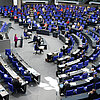Shaping Global Health Policy
Global health challenges call for solutions that have impact beyond sectoral boundaries and national borders. Over the last decade, Germany has positioned itself strongly in the area of global health and made a major contribution on the international stage.
The Federal Government reiterates this commitment by prioritising health throughout its G7 Presidency in 2022. Germany had already included health on the agendas of its G7 Presidency in 2015 and its G20 Presidency in 2017.
The Federal Government is convinced that only an overarching commitment, internationally coordinated across individual countries, in international fora such as the G7 and G20, both at the level of the European Union and globally, hand in hand with the most affected countries, can lower the burden of disease globally and help make populations healthier. This is why Germany is actively involved in precisely these fora and supports public health policy’s central actor - WHO.
In 2015, the international community adopted the UN's 2030 Agenda. It includes a total of 17 Sustainable Development Goals (SDGs). Particularly SDG 3, “Ensure healthy lives and promote well-being for all at all ages” puts the focus on Global Health.
2030 Agenda – SDG 3
The 2030 Agenda evolved from the Millennium Development Goals adopted in 2000. The 2030 Agenda takes these further, using 17 defined goals to take all of the dimensions of sustainable development into account.
International cooperation
International organisations and initiatives have a major role to play in the Federal Government’s worldwide, multilateral work in the field of global health. For many years now, Germany has been committed to international cooperation in an effort to enable health and well-being around the world. Germany is among WHO’s top donors.
Bilateral cooperation, especially with cooperation partners in the EU member states, is another mainstay of Global Health. The German health care system’s high standard of development also suggests the responsibility to share its experience and know-how with partner countries, especially in East and Central Europe, but also in Asia, Africa and Latin America, to help build and expand their national healthcare systems. Conversely, experiences made by other countries must also be analysed to inform our own reform projects.
Germany’s global health policy is based on assessing the opportunities and potentials that can be realised by our contributions to Global Health. Throughout, the Federal Government is guided in its global health commitment by the Global Health Strategy it adopted in 2020. At a time when the commitment to multilateralism and joint action is being challenged globally and yet appears to be more vital than ever, the Federal Government has set itself the task, in its Coalition Agreement, to further pursue the cooperation on Global Health with international partners.
Federal Government’s Global Health Strategy
Thanks to the increasing and high-profile assumption of international responsibility, Germany has come to hold a globally acknowledged leadership role in this field.
Additional information
-
Global Health Hub Germany
The platform for networking and exchange of non-state actors in Global Health
-
International Co-operation
Overview page about co-operation in the field of international health policy
-
European Health Policy
Article about European health policy




























